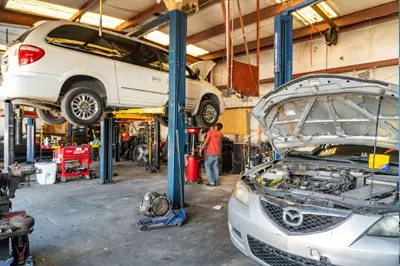All Categories
Featured
While it's very easy to take your vehicle battery for granted, comprehending how to check its health and wellness can assist stop inconvenient breakdowns. Normal checks can expand the life of your battery and guarantee your vehicle runs smoothly.
Why Battery Wellness Issues. Your cars and truck's battery plays a critical function in beginning the engine and powering electronic systems like lights, air conditioning, and the radio. A falling short battery can cause slow-moving begins, malfunctioning electronic devices, or also leave you stranded. Batteries normally put on out in time, yet understanding when they're on the edge of failing can conserve you from these scenarios.
Signs That Your Battery May Be Weak. Before you study checking the battery yourself, it works to be mindful of some common caution indicators that suggest your battery may require focus:

Slow Engine Crank: If your engine takes longer to begin, it may be an indicator that the battery is shedding its power. Dim or Flickering Lighting: When the vehicle is running, inspect the headlights. If they show up dim or flicker while you're idling, your battery can be struggling. Examine Engine Light or Battery Caution Light: Lots of modern-day vehicles will certainly display a battery caution light on the dashboard if there's an issue with the battery or charging system. Corrosion: Visible rust around the battery terminals is a clear indicator of a trouble. This build-up can conflict with the electrical link, resulting in poor efficiency. Constant Jump Begins: If you on a regular basis require to jump-start your car, your battery is most likely near the end of its life and must be changed. Exactly how to Examine Your Automobile's Battery Wellness. Examine the Battery for Physical Damage:. Beginning by evaluating the battery for cracks, leaks, or protruding. Physical damages to the battery instance can indicate that the battery is at threat of failing. If you observe any type of leaks or deterioration, take care, as this could be dangerous.
Inspect the Voltage with a Multimeter:. A simple and accurate way to examine your battery health and wellness is by measuring its voltage. Here's just how you can do it:

Set your multimeter to DC voltage and pick a 20-volt range. With the vehicle off, place the red (favorable) probe on the positive terminal and the black (negative) probe on the adverse terminal of the battery. A healthy battery needs to review around 12.6 volts or more. If the voltage is listed below 12.4 volts, the battery might be weak and require charging or substitute. If it's under 12 volts, it's time to consider getting a brand-new battery. Do a Tons Test:. To truly examine how well your battery carries out under tension, a load examination is perfect. This test is best done by a professional mechanic, but you can do a standard lots test if you have a battery tons tester. Here's a simple method to do it:
Switch off the auto, and determine the voltage utilizing a multimeter as defined over. Beginning the auto and gauge the voltage once again. If the voltage drops dramatically below 12.4 volts when the engine is running, the battery is having a hard time to keep fee and may need substitute. Inspect the Generator Result:. A damaged generator can also trigger battery concerns, as it is in charge of reenergizing the battery while the cars and truck is running. You can check your alternator's outcome by gauging the voltage while the car is on. It needs to read between 13.7 to 14.7 volts. If the analysis is listed below this array, the alternator may not be effectively billing the battery, which might result in battery failure with time.
What to Do If Your Battery Is Weak. If your examinations reveal that your battery's voltage is low or it's not holding a cost, there are a few things you can do:
Charge the Battery: If the voltage is somewhat low (12-12.4 volts), attempt billing the battery with a car battery charger. If it holds a cost, it may be able to last a bit longer. Replace the Battery: If the battery's voltage is under 12 volts or it struggles to hold a fee, it's most likely time for a replacement. Most auto batteries last 3-5 years, so if your battery is nearing that age, it deserves replacing it before it passes away totally. When to Change Your Cars and truck's Battery. While batteries can last for a number of years, it is necessary to change them before they fall short entirely. Below are some variables that might suggest it's time for a replacement:
Age: If your battery is more than 3-5 years old, it's an excellent idea to replace it, also if it hasn't revealed indicators of failure. Regular Problems Starting the Automobile: If your automobile has difficulty beginning even after being jump-started, it's time to get a new battery. Rust or Leaks: If corrosion or leaking shows up on the battery, it might be an indicator that it's reaching completion of its life. Conclusion: Regular Battery Upkeep for Durability. Examining your cars and truck's battery health is a straightforward but crucial component of automobile upkeep. On a regular basis checking your battery will make sure that your automobile runs efficiently and begins dependably every time, and it will aid you stay clear of unanticipated breakdowns.
Latest Posts
Check Out the Best Auto Repair Coupons in Montclare, Chicago
Secure Your Financial Investment with Specialist Seamless Gutter Setup
How Chicago Drivers Trust Montclare Auto Repair for Trusted Service and Great Savings
More
Latest Posts
Check Out the Best Auto Repair Coupons in Montclare, Chicago
Secure Your Financial Investment with Specialist Seamless Gutter Setup
How Chicago Drivers Trust Montclare Auto Repair for Trusted Service and Great Savings
